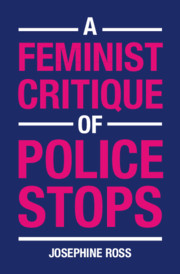Book contents
- Reviews
- A Feminist Critique of Police Stops
- A Feminist Critique of Police Stops
- Copyright page
- Dedication
- Epigraph
- Contents
- Acknowledgments
- Introduction
- Part I Bye, Bye Bill of Rights
- 1 Waive Your Rights: That’s How Stops and Frisks Were Meant to Work
- 2 The Most Dangerous Right: Walking Away from an Officer
- 3 Consenting to Searches: What We Can Learn from Feminist Critiques of Sexual Assault Laws
- 4 Punishing Disrespect: No Free Speech Allowed Here
- 5 Beyond Miranda’s Reach: How Stop-and-Frisk Undermines the Right to Silence
- Part II The Fallout
- Notes
- Index
5 - Beyond Miranda’s Reach: How Stop-and-Frisk Undermines the Right to Silence
from Part I - Bye, Bye Bill of Rights
Published online by Cambridge University Press: 08 December 2020
- Reviews
- A Feminist Critique of Police Stops
- A Feminist Critique of Police Stops
- Copyright page
- Dedication
- Epigraph
- Contents
- Acknowledgments
- Introduction
- Part I Bye, Bye Bill of Rights
- 1 Waive Your Rights: That’s How Stops and Frisks Were Meant to Work
- 2 The Most Dangerous Right: Walking Away from an Officer
- 3 Consenting to Searches: What We Can Learn from Feminist Critiques of Sexual Assault Laws
- 4 Punishing Disrespect: No Free Speech Allowed Here
- 5 Beyond Miranda’s Reach: How Stop-and-Frisk Undermines the Right to Silence
- Part II The Fallout
- Notes
- Index
Summary
Some courts don’t recognize a right to silence during Terry stops. It’s legal now in some jurisdictions for police to arrest individuals for refusing to answer their questions. That’s court-approved retaliatory arrest. While the law governing pre-Miranda silence remains murky, the reality is clear: the teenagers we train can’t successfully invoke their right to silence during a stop-and-frisk without risking retaliation (whether legal or illegal). Court-sanctioned lies compound the difficulty in navigating police stops. When I train teenagers, my law students and I tell them that police are allowed to lie during Terry stops and at the police station. This fact confuses the teenagers we train. “If the officers will lie and say that I consent, why should I bother telling the officer that I don’t consent to searches?” Why learn one’s rights at all? As one teen put it, “The cop will just say I waived my rights no matter what I do.” Terry v. Ohio justified stop-and-frisk on the basis that police would use these stops to gather “voluntary” statements. But statements are not “voluntary” when made under threat. Once we acknowledge this, we see that Terry was built on a lie.
Keywords
- Type
- Chapter
- Information
- A Feminist Critique of Police Stops , pp. 100 - 120Publisher: Cambridge University PressPrint publication year: 2020



